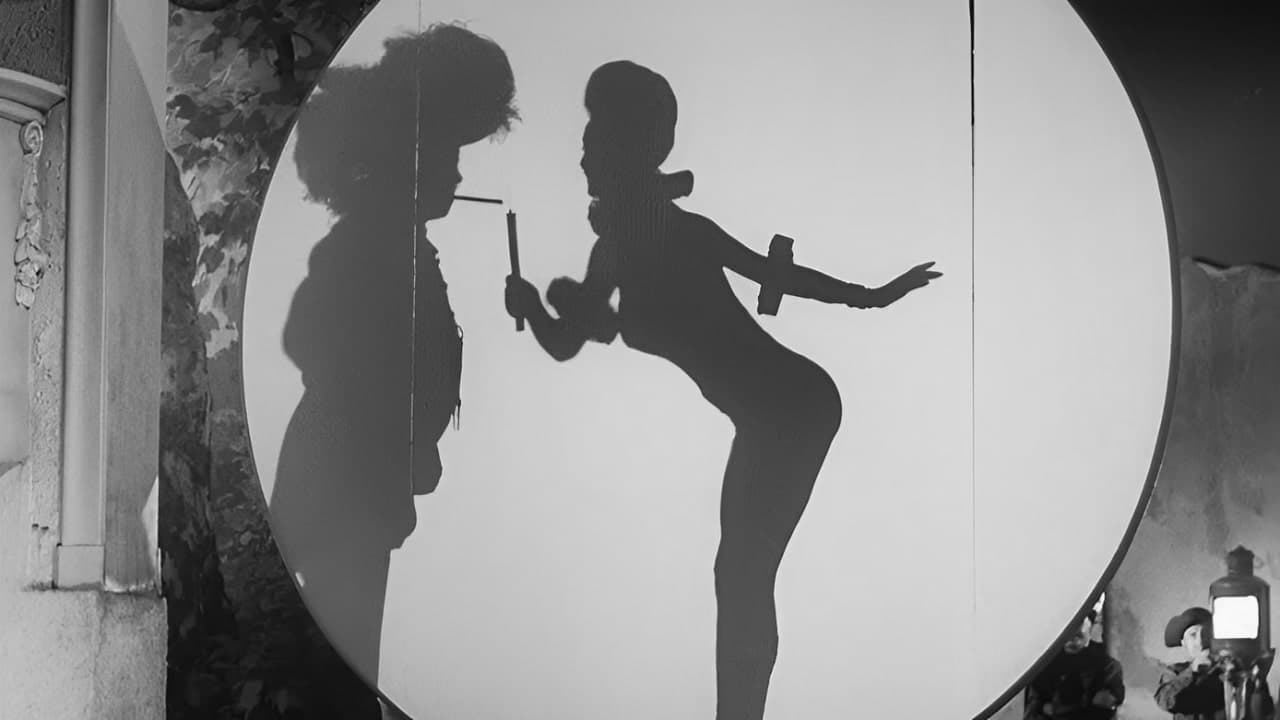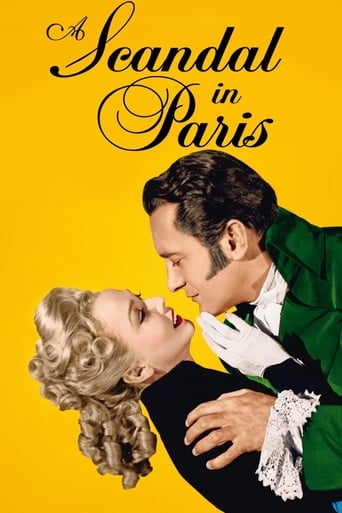

From the title, I suspect the movie was marketed as a peek at those notoriously naughty French and their customs. After all, the year is 1946 and the coldly restrictive Production Code is in force in Hollywood. So audiences have to find titillation where they can and producers have to work in risqué spots as best they can. Here, the apparently nude swim (which really isn't), along with the occasionally revealing and shapely Carol Landis, does provide some visual stimulation. However, it's the script that provides the main innuendo, as other reviewers point out. The trouble is that much of that innuendo is pretty sophisticated and flies by too quickly to be savored. Seems to me, the script may have misjudged the distance between the European movie makers and thrill-seeking American audiences. All in all, I'd be curious to know how the average viewer of the day responded to this exercise in continental style and wit.To me, the movie never really gels. On one dramatic end is Sanders playing it pretty straight, while on the other, is Lockhart clowning it up as a police official, no less. And in between are various shades of seriousness and tongue-in-cheek, such that the movie fails to establish a defining mood. Then too, the severity of the showdown at film's end strikes me as badly out of sync with the lighter parts. Add to that thinly disguised cardboard sets, an unusually dour ingénue (Signe Hasso), and the result is a kind of mish-mash that only occasionally works. Too bad the utterly charming whimsy of the final 30 seconds is not replicated by the feature itself. Still and all, no movie that sticks witty aphorisms onto the sardonic tongue of the incomparable George Sanders can be ignored.
... View MorePositively awful George Sanders vehicle where he goes from being a thief to police czar.While Sanders was an excellent character actor, he was certainly no leading man and this film proves it.It is absolutely beyond stupidity. Gene Lockhart did provide some comic relief until a moment of anger led him to fire his gun with tragedy resulting.Sadly, George Sanders and co-star Carol Landis committed suicide in real life. After making a film as deplorable as this, it is not shocking.The usual appealing Signe Hasso is really nothing here.
... View MoreThere. That's the gist of it. Though the script is really quite good, the picture doesn't quite come off. Sanders is perhaps too much himself here to be very interesting -- his "ennuyeux" style seems just a little TOO little, here -- which creates something of a hole at the center. On the other hand, the supporting cast, with one exception (see below) is superb. First, Akim Tamiroff at 46 in a superb makeup that makes him look not a day over 25 -- he's Sanders's comic sidekick, who, in the last reel turns surprisingly (but satisfyingly) into his nemesis. It's an amazingly detailed performance, constantly interesting -- and really quite out of his usual line. Signe Hasso is lovely in quite a small role (considering her billing), and Gene Lockhart, Alan Napier, Alma Kruger, Vladimir Sokoloff, and, really, all the supporting cast (including, if I'm not mistaken, an unbilled -- and unaccented! -- Julius Tannen as the President of the Bank of France) are excellent and amusing. The child actress Jo Ann Williams (Kay Pierce of "Mildred Pierce" as well, and the child version of Hedy Lamarr in "The Strange Woman") is excellent, on a par with Margaret O'Brien, even. Superb art direction, too. Unfortunately, two elements, imho, are little short of disastrous. First, and most sadly, perhaps, is that Carole Landis is barely adequate in what is the more important of the two female star roles. Unnatural, stagy -- almost amateurish. (Incidentally, she bears a striking resemblance to Dolores Gray.) Finally, and also sad to say, Hanns Eisler's score, though filled with interesting music, is really not right. (In Jon Halliday's interview with Sirk, Sirk reveals that Eisler was not happy with the score -- and even wanted to re-do it completely, but there was no time.) There's just too much of it, and at times (especially in the scenes at the carousel -- one of which is crucial) rather heavy-handedly makes the wrong points. (To clarify, the carousel is identified with a kind of musical chinoiserie. Fine, a little heavy-handed, but all right. When Vidocq catches up with "the dragon" in a final showdown, it happens on the carousel. What do we hear? "Chinese" music. It doesn't work.) Of course this has been for long one of the Sirk rarities. Pace an earlier commentator, this is by no means Sirk at his low point (I nominate "Slightly French," followed closely by "No Room for the Groom" and "Mystery Submarine"); rather in search of a workable style for America. ("Summer Storm" and "Lured" -- Sirk's other "European" films of the forties -- are both much more successful.)
... View MoreHow many "Vidocq" versions are there ? Probably more than you'd want to see.The last one was released a couple of years ago (feat Depardieu) and was a commercial and artistic flop.French versions galore are up for grabs including a miniseries in the sixties.This American version of the thief-turned -cop is a different matter cause it is probably as far as the real life character as it can be.George Sanders' suave portrayal is actually close to Arsene Lupin the French gentleman-burglar invented by Maurice Leblanc.After all Detlef Sierck (Douglas Sirk) was European .Aunt Ernestine is some kind of equivalent of Lupin's old nanny Victoire.The parallel with Saint George and the dragon is a good idea ,when a man has actually to fight against himself on the way to redemption.The film is highly praised in Vidocq's native France:Jacques Lourcelles writes that ,"lost in Hollywood ,Sirk is at home again in an old tale of good old Europa.I must confess I find "scandal in Paris" a bit cold and sometimes dull and I like Sirk best in his "Melodrames Flamboyants".
... View More